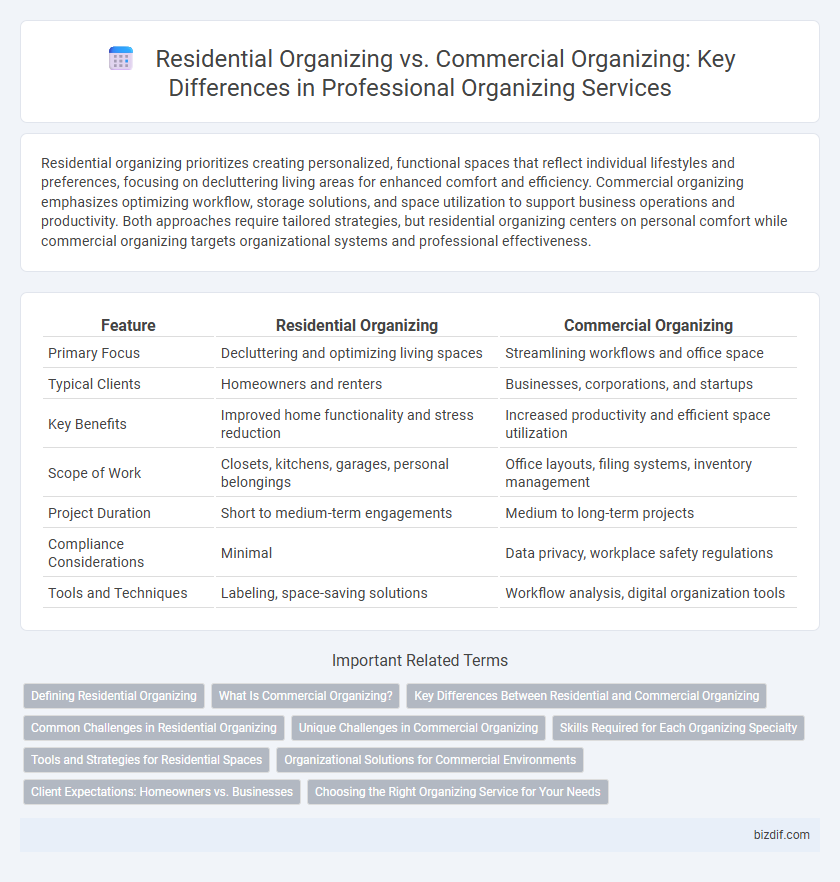Residential organizing prioritizes creating personalized, functional spaces that reflect individual lifestyles and preferences, focusing on decluttering living areas for enhanced comfort and efficiency. Commercial organizing emphasizes optimizing workflow, storage solutions, and space utilization to support business operations and productivity. Both approaches require tailored strategies, but residential organizing centers on personal comfort while commercial organizing targets organizational systems and professional effectiveness.
Table of Comparison
| Feature | Residential Organizing | Commercial Organizing |
|---|---|---|
| Primary Focus | Decluttering and optimizing living spaces | Streamlining workflows and office space |
| Typical Clients | Homeowners and renters | Businesses, corporations, and startups |
| Key Benefits | Improved home functionality and stress reduction | Increased productivity and efficient space utilization |
| Scope of Work | Closets, kitchens, garages, personal belongings | Office layouts, filing systems, inventory management |
| Project Duration | Short to medium-term engagements | Medium to long-term projects |
| Compliance Considerations | Minimal | Data privacy, workplace safety regulations |
| Tools and Techniques | Labeling, space-saving solutions | Workflow analysis, digital organization tools |
Defining Residential Organizing
Residential organizing involves decluttering and arranging personal living spaces such as bedrooms, kitchens, and closets to improve functionality and aesthetics. It emphasizes customized solutions tailored to individual lifestyles, incorporating storage optimization and maintaining a harmonious home environment. Unlike commercial organizing, it prioritizes comfort, personal preferences, and family dynamics.
What Is Commercial Organizing?
Commercial organizing involves optimizing business spaces to enhance productivity, streamline workflows, and improve employee efficiency. It includes organizing offices, warehouses, and retail environments using tailored systems for document management, inventory control, and workspace layout. Unlike residential organizing, commercial organizing focuses on operational functionality and compliance with industry regulations.
Key Differences Between Residential and Commercial Organizing
Residential organizing primarily focuses on creating functional, personalized living spaces by decluttering and optimizing storage in areas like bedrooms, kitchens, and closets. Commercial organizing emphasizes improving workplace efficiency through systematic filing, inventory management, and office space arrangement tailored to business operations. Key differences include the scale of space, the target environment--home versus business--and the specific organizational goals related to personal comfort versus productivity enhancement.
Common Challenges in Residential Organizing
Residential organizing often involves managing limited space and personal belongings that hold emotional value, creating unique challenges in decluttering and storage solutions. Homeowners typically face difficulties balancing functionality with aesthetics while addressing diverse family needs and daily routines. Unlike commercial organizing, residential projects require a deeper understanding of personal habits and lifestyle to create sustainable organizational systems.
Unique Challenges in Commercial Organizing
Commercial organizing faces unique challenges such as managing complex inventory systems, optimizing workspace layouts for diverse teams, and adhering to industry-specific regulations. Unlike residential organizing, it requires coordinating with multiple departments and stakeholders to enhance efficiency at scale. Addressing security concerns and maintaining confidentiality are also critical components of successful commercial organizing projects.
Skills Required for Each Organizing Specialty
Residential organizing demands strong interpersonal skills to customize solutions for individual lifestyles and family dynamics, emphasizing decluttering, space optimization, and emotional support. Commercial organizing requires expertise in workflow analysis, document management, and compliance with industry regulations to enhance efficiency and productivity in office or retail environments. Proficiency in technology tools, project management, and understanding of business operations is critical for success in commercial organizing.
Tools and Strategies for Residential Spaces
Residential organizing prioritizes customized storage solutions such as modular shelving, clear bins, and label makers tailored to individual needs and home aesthetics. Strategies emphasize decluttering personal items, optimizing closet space, and creating zones for specific activities to enhance daily living efficiency. Tools like drawer dividers, cable organizers, and portable filing systems support maintaining order in varied residential environments.
Organizational Solutions for Commercial Environments
Organizational solutions for commercial environments prioritize efficiency, scalability, and compliance with industry regulations to enhance workplace productivity. Custom storage systems, digital filing, and workflow optimization are tailored to meet the dynamic needs of offices, warehouses, and retail spaces. Unlike residential organizing, commercial organizing integrates technology and spatial planning to support team collaboration and streamline operations.
Client Expectations: Homeowners vs. Businesses
Homeowners expect residential organizing to create personalized, functional spaces that enhance daily living and reduce household stress. Businesses prioritize commercial organizing to improve efficiency, employee productivity, and optimize workflow in professional environments. Client expectations differ as homeowners seek comfort and order, while businesses demand systematic solutions aligned with operational goals.
Choosing the Right Organizing Service for Your Needs
Residential organizing focuses on personal spaces such as homes, closets, and kitchens, enhancing daily living through tailored storage solutions and clutter reduction. Commercial organizing targets office environments, warehouses, and retail spaces, emphasizing workflow efficiency, document management, and space optimization. Selecting the right organizing service depends on evaluating the specific demands of your environment, whether prioritizing comfort and lifestyle in residential contexts or boosting productivity and compliance in commercial settings.
Residential organizing vs Commercial organizing Infographic

 bizdif.com
bizdif.com